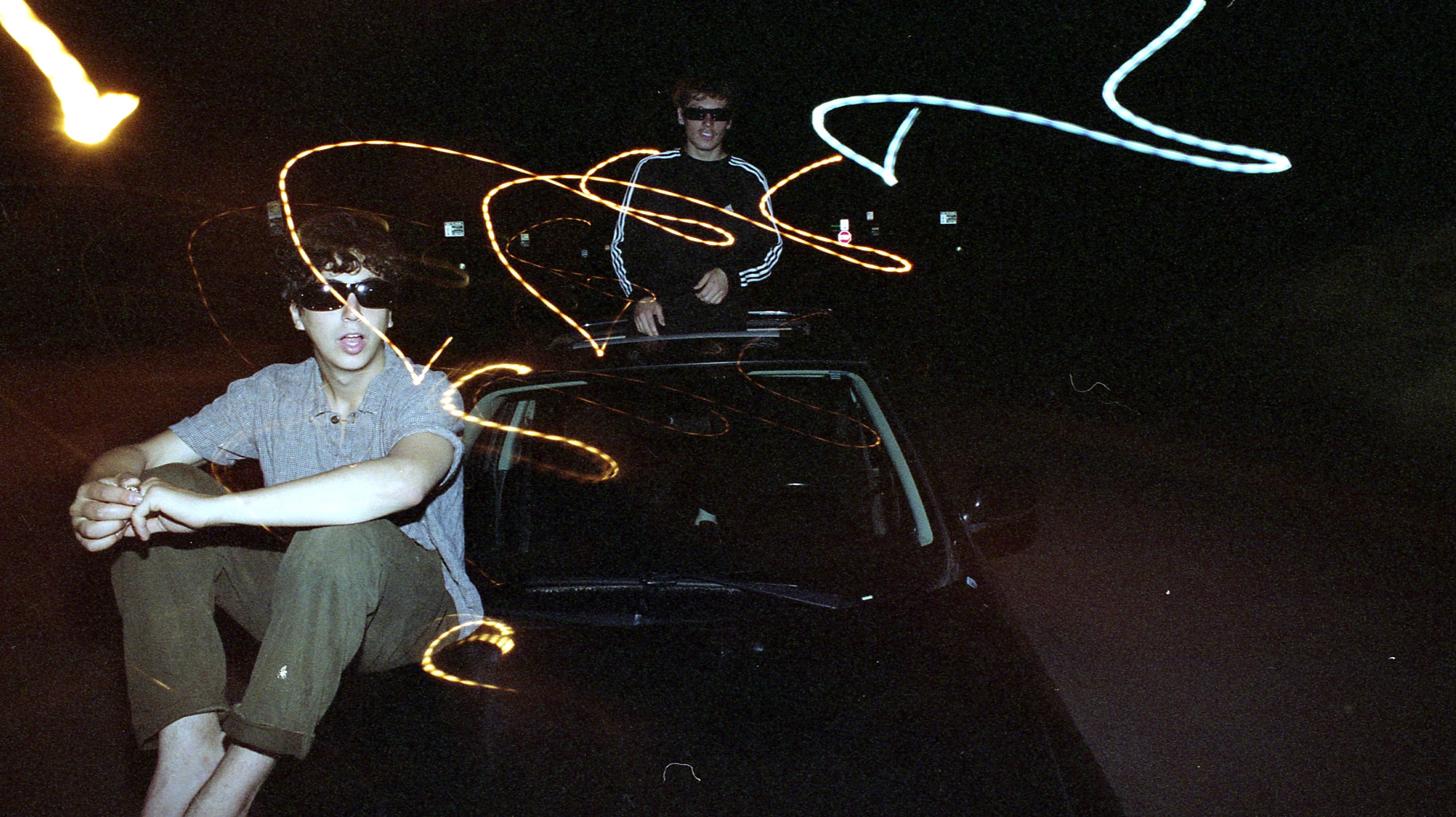MEMBERS: Clay Frankel (vocals/guitar) and Chris Bailoni (synthesizers/production)
FOUNDED: 2016
FROM: Chicago, Illinois
YOU MIGHT KNOW THEM FROM: Frankel’s main gig as a singer and guitarist in Twin Peaks, or Bailoni’s solo project Home-Sick
NOW: Releasing their self-titled debut album via Polyvinyl
“I swear you just talked me into it while I was drunk,” Clay Frankel of Twin Peaks says, of how he was convinced to officially form Grapetooth. The group’s other half, Chris Bailoni, recalls a night in 2016 when his childhood friend Knox Fortune (who won a Grammy for his performance on Chance the Rapper’s “All Night”) needed an opener for his record release show: “We had a few songs we’d made together, and I figured we couldn’t fuck it up that bad.”
That show inspired the completion and release of their first single, “Trouble,” which within months had garnered them a local Chicago fan base and a deal with the indie label Polyvinyl. From the average aspiring musician’s perspective, that’s a feat expected to come after years of tedious business strategy and expensive rerecordings—but Grapetooth insists that their entire album was borderline accidental.
“We had a few songs we’d made together, and I figured we couldn’t fuck it up that bad.” — Chris Bailoni
“A lot of these songs were made from beginning to end in a single day,” Frankel says. Bailoni explains that the album was recorded entirely with a single hundred-dollar microphone in his bedroom. “A lot of people think we went fully analog on this project, right onto tape, but it was really just my laptop, my one synth, and some digital plugins.” He identifies that one synthesizer as a cheap digital Yamaha he found years ago in an alley behind a friend’s house. It’s the primary instrument of every song they made.
For an album so satisfying to come together impromptu is hard to believe—but at the same time, it feels like the only possible way. Perhaps the delinquent bounce of “Trouble” or the post-punk anthem “Violent” are works that could only be achieved as a result of dadaist automatism, Frankel’s Sky Saxon–esque howl meshing alchemically with Bailoni’s white-hot synth stabs on each track.
As we discuss the recording minutiae at length, a jarring scratching noise overtakes the call. “Oh, sorry, can you hear that over the phone?” Frankel asks, interrupting Bailoni’s train of thought. I ask him what the noise is. “I’m just drawing something into this table with a screw,” he says. “I actually built this table, by the way.” During the interview, they are sketching ideas for their own merch. I ask him if he’s hand-built anything else lately. “I built a snorkel with a hose once. It didn’t work.” Even with major indie backing, the two certainly haven’t shed their DIY work ethic.
Shellacking the album’s vibe of an intoxicated vision quest, Frankel reveals that the lyrics on “Hangover Sq.” are lifted almost word for word from a poem that opens the 1941 Patrick Hamilton novel of the same name. Hangover Square, and its subsequent film noir adaptation, is a black comedy based on an alcoholic drifter with dissociative identity disorder. “I had a habit of wandering toward Chris’s bookshelf to get a lyrical ball rolling, and just started singing it as I opened to the page,” says Frankel. “It was really serendipitous because, rhythmically, it fit perfectly into the vocals I had in mind.”
“Any art project should start as something just for yourself and maybe a few friends,” Bailoni says of Grapetooth’s long-term mentality. The typical career musician’s path is fraught with perfectionism, second-guessing, and twentieth takes, but the real deterrent of a dream seems to be all that strategizing in the first place. Be it synthesizers from back alleys, lubricated commitments, or black-comedy transcriptions, Grapetooth’s existence can attest that finding greatness has little to do with deliberately looking for it. FL
This article appears in FLOOD 9. You can subscribe to the magazine here.









